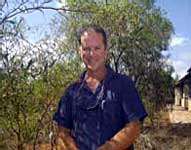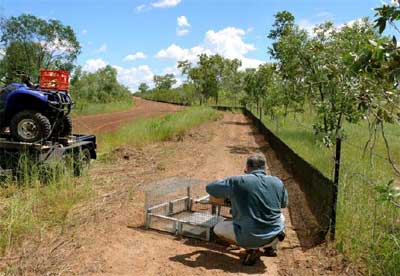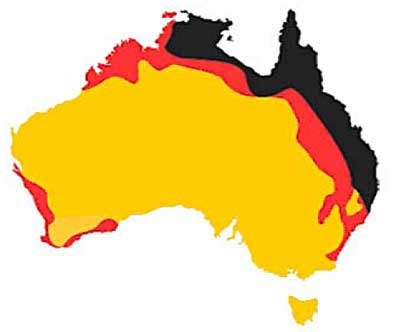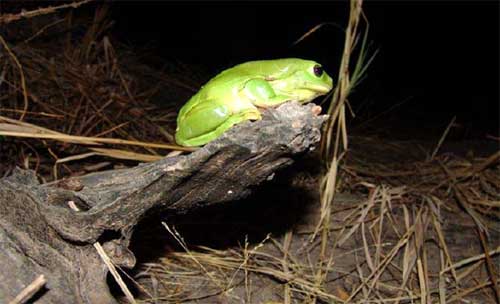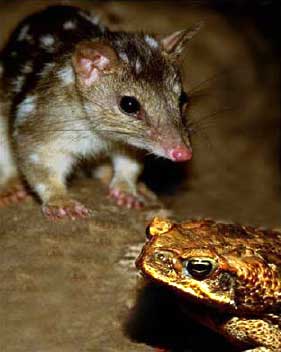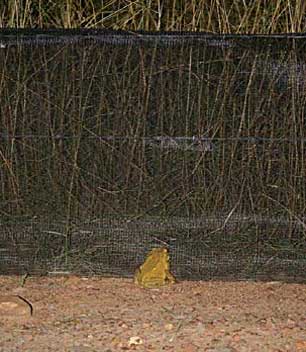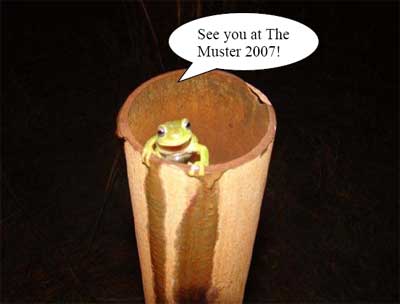

Get your Stop The Toad
bumper sticker here ..

Web Masters:
Use this button to
link back to this site.

Toad News21 June 2007Available in pdf here (280 kb) Staff Changes The Stop the Toad Foundation (STTF) has appointed Mr. Russell Guého as interim CEO following the departure of Campaign Manager Dennis Beros. Mr. Guého, who is a current Foundation Board member based in the Kimberley, was instrumental in bringing the cane toad issue to public prominence. His early efforts encouraged the Kimberley tourism industry in 2004 to recognise the serious threats that toad infestation pose for industry and local communities. “We’re sad to see Dennis go,” said Mr. Guého. “But we’re proud that under his tenure the Foundation has played a major role in alerting both the government and the statewide community to the imminent threat of infestation. Dennis has a young family and is committed to enjoying more quality time with them in the future.”
The outcomes of STTF’s Great Toad Muster 2006, during which more than 49,000 cane toads were removed from a key landscape over a six week period, have demonstrated the effectiveness of a coordinated approach to toad control. “Dennis oversaw the pioneering removal of cane toad populations at a landscape scale using a cost effective and integrated volunteer strategy. Now is the time to consolidate and move forward in the battle against the toad – there are a number of ongoing and recent initiatives that are encouraging to all those involved in the fight,” said Mr. Guého. “In recent weeks there has been more news of the parasitic lung worm that is impacting on toads; some exciting work has been done on specific pheromones which can be used to force metamorph toads to develop in a weakened state and a private company has developed a spray application technique that kills toads literally in seconds.” Much of this work has come about due to the efforts of community groups alerting the community and operating on the ground at the front line. “This is a perfect time to co-operate and promote the strategies of all those involved in toad management activities,” said Mr. Guého. “That includes government agencies as well as volunteer groups. We’re in this together.” Planning is currently underway to repeat the Great Toad Muster between mid September and mid October 2007. “It is imperative,” said Mr. Guého, “That we have the opportunity to undertake this second Muster to build on the effective work already done in 2006 and the lessons learnt from it.” “Fiona Rafferty is also working with the Foundation in the capacity of Sponsorship coordinator and she has some exciting arrangements ready to role out in the near future which we are sure will attract significant corporate and individual interest. The Foundation has deductible gift recipient (DGR) status with the Australian Taxation Office so we hope to attract significant Australian support in this battle.”
Further information is available here or call Russell Guého 0408 954 254 (Russell, who lives in Broome, is volunteering his time in this interim period and is also a Board member of STTF who has lived in the Kimberley for over 20 years)
Ministerial Review of Activities of Groups working on Toad Control Activities The Hon David Templeman, Minister for Climate Change, the Environment and Peel has initiated a review of the activities of the Foundation, Department of Environment and Conservation (DEC) and Kimberley Toad Busters (KTB) – essentially STTF was asked to contribute suggested terms of reference for the review process (DEC and KTB were also asked and contributed). It appears that the Invasive Species CRC will be conducting the review. The Ministers office indicated that the process was expected to be completed by end of June and reporting /Ministerial action by end of July (we hope this can be achieved given the issues associated with organisational logistics for the Muster).
Cane Toads are still high on the Agenda of the WA Government The recent State Budget contains a couple of interesting points from STTF and other volunteer group perspectives – In the Significant Issues and Trends section immediately following the DEC Mission statement the following statement is made “Continued focus on Government and community efforts to stop cane toads expanding their range from Northern Territory to Western Australia.” This is followed shortly after in the Major Achievements section 1; Nature Conservation 2006-07 with the comment claiming “The State Cane Toad Initiative continued to focus on keeping toads out of Western Australia through field and awareness programs with community involvement.” STTF believe that with appropriate support from Government all groups can have a significant impact on cane toad populations near the frontline in the Northern Territory.
Already toad populations are under environmental pressure in the Northern Territory with cool drying conditions following a rather under average ‘wet season’ in the Victoria River District. These conditions provide added impetus to undertake the 2007 Great Toad Muster and we are looking forward to receiving the results of recent reconnaissance in the Auvergne Whirlwind Plains area. Breakthrough Cane Toad Seminar to be held at University of Western Australia The Invasive Animals Co-Operative Research Centre would like to invite you to a free public lecture, with presentations from Professor Rick Shine of the University of Sydney, Professor Rob Capon of the University of Queensland and Dr David Dall of Pestat Ltd. Titled: ‘New tools for cane toad control? Recent
discoveries in pheromones and parasites,’ the presentation
will be made at the Woolnough
Lecture Theatre at UWA on June 25, 2007 from 4pm – 6pm. This seminar may provide information on a range of new tools to be added to the cane toad control strategies of the Foundation, including those mentioned above. The Great Toad Muster 2007 ‘In now permitting the liberation of Bufo in the cane areas of Queensland, we may be confident that no element of casualness has been involved in the decision, but that every biological aspect known to science has been carefully considered.’ Australian Sugar Journal, 1936 In actual fact the cane toad introduction into Australia was unaccompanied by relevant research and indeed has proven to be one of the most significant biological blunders ever to be foistered upon Australia ecosystems. The toad is now the most common vertebrate across much of Queensland and the Northern Territory. As many as 5000 per hectare have been recorded around waterholes and they have been allowed by complacency and ineptitude to march their way through Kakadu and Arnhem Land in the Northern Territory. August 18, 2005 was a significant date in Australia’s history as it marked two milestones. It was the day on which we “celebrated” the 70th anniversary of the introduction of toads into Australia by the Queensland sugar industry and perhaps more significantly, the day Western Australians drew a significant ‘line in the sand’ and said “We don’t want cane toads in our State!” What has developed over the past 18 months has begun to show that in reality there is plenty that we can do to, if not stop toads totally, then significantly impact on their populations and effects on the landscape. When people set their minds to having a crack at getting rid of these pests they can have a huge impact on toad populations
Over a six week period during the late dry season 2006 over 49,000 cane toads were removed from the Timber Creek area (Northern Territory) by over 100 volunteers associated with the Stop the Toad Foundation. There were Vietnam veterans rubbing shoulders with boffins, grey nomads, Kimberley residents, National Living treasures and backpackers from all over the world with the one focused aim – remove as many toads as possible. Western Australia has done something unique. The people of this state have decided to have a go at keeping our competitive advantages secure and along the way ensure that our cultures, our social activities, our environments and our economies will have a chance of being preserved for future generations.
Plans are underway to repeat the Great Toad Muster of 2006 with a follow up Great Toad Muster 2007. At this stage the Muster will kick off in mid September and go through to mid October. The Stop the Toad Foundation is looking for support to help the event run smoothly and safely. If you think you have skills in Communications, Catering, Logistics or Camp management and would like to get back out into the bush for some adventure then maybe you should contact the Foundation. The job, of course, will long and hard. But there is an ingrained attitude in Australia that we have never shirked challenges and what the heck! Surely no one in this country has ever bagged anyone for having a fair dinkum go. For more information on how you can help or be involved in busting toads:
|
||||||||
Supported by |
 |
Web Manager: Dave Graham - Web hosting & scripts: Alex Varlakov http://ozup.com/ |



